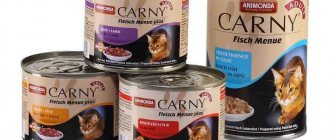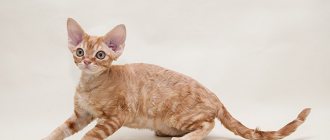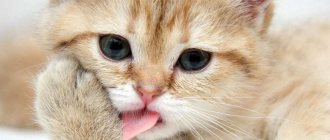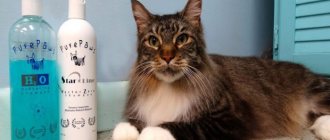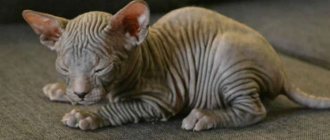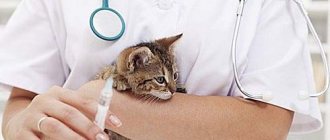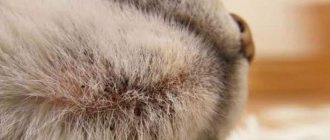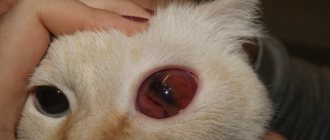Brief history of the breed
Great Britain is considered the birthplace of unusual animals with curly hair. Their story began in the 1960s when a resident of the English county of Devonshire picked up a stray cat on the street and took it into her home. After some time, she gave birth to kittens, one of which had curly hair and was very different from its littermates.
The unusual baby was named Kirley and was initially considered a relative of the Cornish Rex. To verify the correctness of this assumption, he was shown to the famous breeder Sterling Webb.
Breeder bred Kirley with her Cornish Rex cats in hopes of producing curly-haired offspring. But the babies born did not inherit curly fur.
After several unsuccessful attempts, it became clear that Kirley has nothing in common with the Cornish Rex and is the carrier of a unique gene responsible for curly hair. Then he was crossed with his own mother, and later with his sisters.
As a result, breeders managed to fix the mutation responsible for the curly coat, and in 1979 the Devon Rex was recognized as an independent breed.
Reviews
miv
The character is a miracle, about vindictiveness - this is not about the Devons at all. Devons love people madly, love to play pranks, and never remember an insult. It’s impossible to scold Devon, but still, if you have to make a suggestion, in a minute he’ll be back with you like a tail, they’re not touchy. But they like to consider themselves the main ones in the family, with properly built relationships, you are the main ones in the house, everything is wonderful. And about the smell and dirty hands, that’s not true. Unless, of course, you don’t wash the cats at all, this also happens; well, it will probably be unpleasant to pet any breed. Devons do not smell if they are looked after properly. I don’t know a smarter breed or a stickier breed. It’s strange to read this about cats; in the Devons, the cats will love you to the point of obsession at times, constantly asking to be held and climbing on your arms like monkeys in a circus. Lately, some negative reviews have begun to appear about girls, but I believe that it all depends on the conditions in which the kitten grew up, how much time they interacted with him while he was growing up, and how they communicated. The girls will still come, but do you think there would be so many people suffering from devomania if they were so bad in character, vindictive and it would be unpleasant to pet them? As a rule, breeders observe a different picture: where one girl settles, after a while a second one appears, delays this matter, and they take him for his extraordinary character, and of course his incredibly beautiful appearance.
nateana
It’s very strange to read about the unpleasantness of Devons... I, for example, due to my workload, did not suffer from frequent bathing of Devons, but they always told me that they either smell very pleasant (something like perfume, apparently they take on the smells of the house), or, on the contrary, they were surprised that cats don't smell at all. Precisely cats, and not in the absence of smell in the house... Although they often talk about this in surprise... well, I don’t even want to answer about “vindictiveness”... this is not a Devon... P/S/ don’t consider it a pervert, but even if Devons smell, it’s very nice... some kind of buns or something... after sleep... or kittens... In my practice, people’s lives and worldviews changed for the better - Devons are faster than psychotherapists in getting rid of depression...
Egoza
I fell in love with Devons at first in the picture, then I saw them live and fell in love with them! Their character is wonderful! The girls are very affectionate, they always “migrate” behind you (they don’t get under your feet), it’s just which room you’re in and they get along great with all family members and guests. Each cat has its own unique charisma; they have a pleasant and melodious voice. And how smart they are! As for the dirty hands after them, it actually made me laugh! They have fur and need to be bathed from time to time...Have you ever petted a Devon, Selena0810?...It’s like ironing velvet, a broadtail skin...you will never forget a Devon’s skin and never confuse it with anything! You write that this woman’s daughter is a veterinarian, so there is no doubt that the animals received proper care. Care is one thing, but love is another! Do you notice the difference? I agree with Larisa that a lot depends on the conditions in which the animal was kept and raised. Devons love attention and simply need it, they listen well and respond in return. These are cats and dogs... Cats in this breed generally love people so much! They will caress, crawl under your arm and look into your eyes, constantly asking you: “Mom, do you really love me?” And I love you so much!” Each person has his own character, each is individual, but each has his own animal. I used to have British cats, they are beautiful, imposing, not intrusive, beautiful in the interior..)…… but this is not my thing! Now, having girls, I realized what a happiness it is when they are nearby! These are my cats. We live in the same rhythm! Listen to yourself and listen to yourself, go to exhibitions, look, pet... It’s true what they say, every cat has its own person..
Video
Interesting Facts
Over the years of the Devon Rex's existence, many interesting things have been associated with them:
- The meowing of these curly-haired cats is more reminiscent of the chirping of birds. Devon rexes are capable of producing sounds of a frequency that is not recognized by human hearing.
- Representatives of the breed have repeatedly become cartoon and movie characters. In 1984, the Devonshire Rex became the hero of the film “Superman II”. Also, the curly-haired beauties inspired the creators of the cartoon “Cats vs. Dogs,” who presented them as ninjas.
- Devonshire Rexes have a very warm body - this becomes noticeable if you pick them up. Therefore, representatives of the curly breed are often called “hot cats.”
- Devon Rexes have a limited gene pool, so the CFA allows crossing representatives of the curly breed with British and American Shorthairs. TICA allows breeding with Bombays, Siamese and European Shorthair cats.
Origin story
Based on the history of the origin of the breed, Devons owe their expressive appearance to spontaneous gene mutation. The first cat appeared in England, in the vicinity of the town of Devon in the 60s of the last century. It fell into the hands of Miss Beryl Cox. The animal turned out to be a girl, who after some time gave birth to healthy kittens.
In one of the litters there was a kitten named Kirley, who entered his name into the world felinology - he was the first representative with the fur characteristic of a Devon Rex. He was bred with Cornish cats, but the resulting kittens did not inherit the interesting type of “coat”.
However, it is Kirli who is considered to be the ancestor of the Devon breed, which was so popular with the European public. They conquered America twenty years later, having received international recognition and a unified breed standard.
At the moment, the Devon Rex has an insufficiently diverse gene pool. To improve it, felinologists approve of mixing this breed with others in order to introduce new blood and genotypes. Crossbreeding between Devon, British, American Shorthair, Bombay and Siamese cats is allowed.
Breed description, appearance standards
Devonshire rexes have an exotic and memorable appearance. They have expressive large eyes, huge locator ears and curled mustaches. But the main feature of the Devon Rex is its curly coat. The description of the breed is presented in a generally recognized standard.
Dimensions and weight
Cats of this breed are small in size. The weight of Devons ranges from 2.5-4.5 kg. Moreover, females are slightly smaller and more graceful than males.
Anatomical characteristics
A classic representative of the Devon Rex cat breed must meet the following description:
- The head is small, wedge-shaped, with a short muzzle, neat nose, massive chin and rounded cheeks. The stop is clearly visualized.
- The eyes are large, oval, widely set. The iris is colored green or yellow, harmonizing with the color of the coat. Devons with color point coats may have blue eyes.
- The ears are large, wide at the base with rounded tips. The outer part is covered with fine short hair.
- The body is flexible, graceful with fine bones, a graceful neck and a massive broad chest.
- The limbs are very long, slender with small oval paws.
- The tail is covered with short hair, long, with a rounded tip.
Color and coat type
The Devon Rex has soft, short, slightly curly hair of varying thickness. Thinner hair grows on the cat's chest, neck and belly. On the face, sides, tail and back of the Devon, the fur is much thicker.
According to the standard, curly cats can have any color. Devon Rexes are:
- Single color. In this case, the cat's fur is uniformly colored red, cream, white, chocolate, blue, black or any other shade.
- Bicolors. This color is a combination of black or any other primary color with white.
- Tabby.
- Tortoiseshells.
- Color point.
Possible breed defects
Flaws in appearance, in the presence of which the Devon Rex will not receive a high expert assessment:
- small ears;
- short tail;
- disproportionately elongated head;
- hard wool.
Serious defects for which a Devon Rex cat is subject to disqualification:
- pronounced bald spots;
- shaggy, long hair;
- creases on the tail;
- polydactyly;
- strabismus.
Lifespan
Devon Rexes are relatively robust cats. On average, curly-haired pets live 14-18 years. But we must not forget that the life expectancy of Devons is influenced by many factors, including living conditions and nutrition.
Tips for choosing a kitten.
Buying a kitten secondhand means putting yourself at risk, especially if the price is too low. A good cattery should have 7-8 years of experience and a large database of kittens sold. Particular attention should be paid to the price: the lower it is, the less conscientious the breeder was towards his pupils. Often these Devon Rex kittens have diseases that appear at a later age, as well as a poor pedigree.
Next, you need to decide on the class of pet you need. If you want a pet, then a pet class is suitable. If for exhibitions, you need the most expensive show class. And if you want to start breeding this breed, then the choice will fall on the breeding class.
If you have your sights set on a show-class kitten, then you should know a few points in which the animal will not be able to receive a high rating or will be disqualified. Animals with too coarse fur, disproportionate ears and head, or a short tail may receive a low score. Disqualification also awaits pets with a crooked tail, bald spots, strabismus, polydactyly and too long hair.
It is worth noting that when purchasing a pet, no one will guarantee a successful exhibition career. The main thing you need is to pay attention to the condition of the animal, and also ask to see its parents.
Be sure to pay attention to the conditions in which the animals are kept. The area must be clean and tidy. Observe the kitten itself - its behavior can say a lot. Since Devon Rexes are quite active animals, the future pet should not be lethargic and bored. It should not have a painful appearance or external defects.
Once you have decided on a kitten, ask to see the breeder's veterinary passport. The animal must have all vaccinations according to age; it is not necessary to have a brand. If the cattery takes care of its kittens, they will already be litter box and scratching post trained by the time you take them home. The age of purchase of a kitten must be at least 3 months.
Character and temperament
Devon Rexes are affectionate and sociable cats that quickly become attached to people. Sociable animals are similar in character to dogs. Curly-haired cats always try to be closer to their owners and do not tolerate loneliness well.
Devons are quite cunning and can show amazing impudence. With too much attention, cats of this breed quickly turn into spoiled creatures and even begin to steal food from the table.
The Devon Rex has a good-natured character. A cat of this breed gets along well with children and takes part in joint games with pleasure.
Devons are friendly towards their fellows. With proper upbringing, representatives of the breed get along without conflicts with dogs, ornamental birds and rodents.
Behavior and character
Do you know people who have dreamed of having a dog all their lives, but their apartment only has enough space for a cat? You can convey that their dream can come true in one moment if they buy a Devon Rex - a real cat. This breed has qualities that are not typical for domesticated felines:
- devotion;
- the desire to constantly follow the owner;
- dependence on the mood of a loved one;
- love of walking outside;
- the joy of swimming, etc.
The character of this pet is a real gift for a person
What can I say, when these cats are in the company of their beloved owners, they wag their tails not out of anger, like their relatives, but out of great happiness and inspiration. Representatives of this breed become attached to people in the same way as dogs. If you are at home, the cat will follow you around, and it is possible that he will carry toys in his mouth so that you can spend time with him in a fun playful romp. However, like dogs, Devon Rexes require constant communication with their owner. If he rarely sees his human, then most likely the cat will soon:
- will refuse to eat;
- will become depressed;
- will weaken;
- will pick up some illnesses against the background of a general disorder.
Unfortunately, these cats are also prone to breed diseases.
If you are rarely at home, the Devon Rex is not your option, as this animal can easily die of boredom. As soon as a cat has a chance to be close to his beloved owner, he strives to get as close to his face as possible, taking the position of a collar on the neck and shoulders of his loved one. You will be touched, but this animal loves to look into the eyes of a loved one, because, as you know, they are the mirror of the soul, and who better than the soul can tell how strong the love of this creature is for the one who gave him a home and shelter. Due to their affinity for humans, these cats are highly trainable, and they can easily be taught to perform commands that are completely unusual for cats, for example:
- "Sit!";
- “Give me your paw!”;
- “Roll!”;
- and even “Aport!”
However, even kittens can learn these commands, and adults sometimes demonstrate real miracles of training. The ingenuity of these animals, a high level of intelligence and willingness to fulfill the whims of the owner are, perhaps, the best qualities of representatives of this breed.
Representatives of this breed can easily learn to give paws and bring you toys in their teeth
It must be said that Devon Rexes get along well with children, skillfully directing the destructive power of children who understand nothing about dealing with living beings into an adult direction. These cats can not only play pranks themselves, but also calm your child. By the way, they often show, oddly enough, security abilities. Many Devon Rex owners have more than once found their pets nestled in a cradle next to their child, purring and carefully monitoring the approach of all strangers to the baby.
How to choose the right kitten
The Devon Rex is a fairly rare breed, and in order not to buy a “pig in a poke”, it is better to look for a kitten in certified nurseries or from trusted breeders. Before purchasing, it is advisable to make sure that the curly-haired baby has all the necessary documents confirming that he is not a mestizo, and to evaluate the conditions of his detention.
The kitten should be moderately well-fed, active and tidy. It is important that he has a soft belly, curly fur, clear eyes, clean ears and smooth skin.
On a note. A healthy Devon Rex kitten should not have an unpleasant odor from the mouth, dirt in the ears or under the tail.
Kitten care
Until the age of three months, Devon Rex cats are kept with their mother, and care for them lies with the breeder. Usually, by the time they move to a new home, curly-haired kittens are already quite independent and know how to take care of themselves. Little Devon Rex eat dry or natural food with appetite, go to the tray and use a scratching post.
The new owner just has to show the curly-haired kitten where his bowls, bed and toilet are located. In order for the little Devon to quickly adapt to changed conditions, he is petted more often and called by name.
A curious baby will definitely explore new possessions and may accidentally get injured. Therefore, small and fragile objects, household chemicals, ornamental plants and electrical wires are removed from it. Also, for safety reasons, the curly pet is denied access to open windows, washing machines and ovens.
To prevent the stress of a change of environment from being aggravated by digestive problems, at first the little Devon Rex is fed what he is accustomed to from the breeder. The diet is based on the age of the curly-haired kitten:
- up to 3 months – 5-6 times a day;
- 3-6 months – 4 times a day;
- 6-11 months – 3 times a day.
From the age of one year, Devon Rex cats are fed twice a day.
Catering
Devons can eat both “natural” and ready-made food, but both options have their own nuances.
Recommended food
Choose industrial feed from the super-premium or holistic lines. These feeds have a balanced composition, an abundance of vitamins and minerals necessary for the full growth and existence of the animal.
Economy class food (and most of the premium food) do not provide any benefit to animals: instead of high-quality meat, they use so-called “meat waste” (and what is hidden under this name is a big question), a lot of preservatives, dyes, and flavor enhancers.
- List of holistic foods: Wildcat, Pronature Holistic, Orijen.
- List of super-premium foods: Brit Care, Arden Grange, Vet Life.
Below are recommended super-premium foods. Links with the names of the food are clickable, on them you can, within our website, get acquainted with the descriptions of the food and read reviews from owners of Devon Rex cats.
| Holistic | Super premium | Super premium |
| Wellness CORE | Duke's Farm | Vigor & Sage |
Natural products
A natural menu should include:
- High-quality lean meat: beef, veal, chicken, rabbit, lamb and turkey (daily);
- By-products: chicken necks, liver, hearts, ventricles (every 2 days);
- Chicken and quail eggs: quail eggs - fresh, chicken eggs are boiled and only the yolk is given;
- Lean sea fish: hake, salmon (no more than once a week). You can pamper your pet with squid and shrimp;
- Fermented milk products: low-fat cottage cheese, sour cream, cream, natural yogurt without additives or dyes, Varenets, cheese, kefir (daily);
- Cereals: buckwheat, millet, oatmeal, rice (daily);
- Vegetables: carrots, zucchini, pumpkin, green beans, green salad (daily);
- Vegetable or olive oil (a few drops in porridge every day).
- Sprouted wheat or oats.
Your pet's bowl should always be filled with fresh and clean water: bottled or settled. Bowls should be washed daily, the water should be changed 2 times a day: morning and evening.
It is prohibited to include in the diet:
- Fatty meat (pork, goose, duck);
- Offal, bones, lard, skin;
- Fermented milk products with preservatives and dyes;
- Juices, carbonated and mineral water, alcohol, tea, coffee, cocoa;
- River fish;
- Sausage, frankfurters, small sausages;
- Smoked meats, human canned food;
- Flour, baked goods, sweet, salty;
- Eggplants, grapes, avocados, white cabbage, chickpeas, peas, garlic, onions, potatoes, mushrooms;
- Spices, sauces, mayonnaise, seasonings.
Adult healthy cats are fed 2 times a day, cats aged 4-6 months - 3-4 times a day; kittens 2-3 months – 5-6 times. Food is given at a comfortable temperature, neither hot nor cold.
Pictured are kittens of the Devon Rex breed
Devon Rexes are lactose intolerant, so milk is also prohibited. Raw liver is not digestible: it must be stewed or boiled.
Care and maintenance
Due to the lack of dense undercoat, the Devonshire cat does not tolerate low temperatures well. Therefore, it is better to keep it in a warm room, away from dampness and drafts.
In general, caring for cats of this breed comes down to regular hygiene and proper feeding. To make Devon Rex cats look neat, they are systematically subjected to simple procedures:
- The large ears of a curly cat are cleaned weekly of accumulated dirt and dust. The inner surface of the Devon Rex shell is wiped with a soft cloth soaked in a special alcohol-free lotion, and the ear canal is carefully treated with a cotton swab.
- Discharge accumulates in the corners of a curly cat's eyes and needs to be removed. They are wiped daily with a cotton swab moistened with boiled water or chamomile infusion.
- The claws of the Devon Rex are shortened with a nail clipper as they grow. The procedure is carried out as carefully as possible so as not to touch living tissue and not cause pain to the curly-haired cat.
- Devon teeth need periodic cleaning. They are treated 2-3 times a month with a non-foaming paste, which is applied to a special nozzle or silicone brush.
- The curly hair of the Devon Rex is covered with a special fatty lubricant, an excess of which causes the hairs to stick together. Therefore, cats of this breed need regular washing. They are bathed with special shampoos without the use of moisturizing conditioners.
On a note. Devon's curly coat should not be blow-dried. Hot air spoils the cover, making it fluffy. It is also not recommended to comb cats of this breed, so as not to damage the fragile hairs.
Diseases and health problems
Devon Rexes live 15 – 17 years, the average lifespan of a cat. The mutation does not reduce their viability and they have practically no breed-specific diseases, except for muscle dysfunction. There are acquired non-hereditary diseases and the difficult legacy of the numerous breeds with which they were crossed.
Such as:
- Hip dysplasia is a congenital disorder that causes difficulty moving;
- A luxated kneecap, if not corrected immediately, can lead to inflammation of the joint and surgery;
- Hypertrophic cardiomyopathy is a disorder of the heart during exercise that causes shortness of breath and death.
For the breed, genetic testing can be done for:
- Blood type;
- Identification of allergens of different nature: food, plant, environmental;
- Detection of viral pathogens FIV (immunodeficiency), FLV (leukemia), FIP (infectious peritonitis), FHV-1 (herpes viral rhinotracheitis) and feline chlamydophila;
- Hypokalemia – a decrease in potassium levels in the blood, which leads to muscle weakness;
- Polycystic kidney disease is the formation of numerous cysts with water that disrupt the functioning of the organ.
For preventive purposes, it is useful to regularly treat even domestic animals against parasites. Their eggs, or even the parasites themselves, can be carried into an apartment on shoes and clothes. If fleas appear, then you can expect helminths. Fleas carry and spread their eggs. Another problem associated with jumping insects is the allergy they cause in cats.
There are a lot of remedies, drops and sprays for fleas. Cats usually don't like sprays and the hiss of the spray irritates them. So drops on the withers are much better. When choosing a product, you should pay attention to which groups of worms it acts on. It is advisable that both round and flat ones be affected - both are popular with cats.
Feeding the cat
Devon rexes are omnivores. They equally readily consume both industrial and natural food. True, it is not recommended to mix these two types of food, and the owner will have to choose one.
With the industrial type of feeding, the Devon Rex buys premium or super-premium products produced by trusted animal food manufacturers. Such drying should not contain any dubious additives such as soy, preservatives or dyes.
The following brands fit these requirements well:
- Royal Canin;
- Gemon;
- Bosch;
- Pronature.
Important. A Devon Rex that eats dry food should have unlimited access to clean drinking water.
With a natural type of food, the diet of a curly-haired cat should contain about 70-80% fresh lean meat. Also, the Devon Rex is additionally given:
- dairy products;
- lean sea fish;
- boiled eggs;
- porridge with water;
- offal;
- boiled vegetables.
In order for a cat of this breed to remain healthy and active longer, pork, fresh milk, onions, potatoes, sweets, smoked meats, baked goods and sausages are completely excluded from its menu. Also, the Devon Rex should not be fed river fish, bones, or any leftover food from the master’s table.
Education and physical activity
Devon Rexes are smart and highly intelligent cats. They quickly understand what is required of them and get accustomed to the tray and scratching post without any problems. And if desired and with due persistence, Devon Rex can be trained to fetch and carry out simple commands.
Important. Devon Rexes are distinguished by a violent temperament, which can only be curbed by establishing prohibitions. Therefore, a curly-haired kitten is taught to follow certain rules of behavior from an early age.
To give the Devon Rex the opportunity to throw out accumulated energy, he is given several toys and equipped with a special complex with multi-level shelves and ladders.
Devon Rex character
People who acquired Devon Rex kittens were satisfied. According to their enthusiastic reviews, the cat quickly becomes attached and gets used to its owner. The breed is suitable for people with a freer schedule, as they require attention and affection.
Devon Rex dogs are easy to train and quickly pick up simple commands. You can train a kitten to respond to its name. Ingenuity and excessive playfulness are inherent in cats of any age. Devons are energetic and lead an active lifestyle. Like all cats, they are prone to mischief. For example, they can allow themselves to climb onto the table to taste a tasty morsel. This does not at all indicate that the breed is “innately spoiled.” Kittens need education, otherwise they themselves will boss you around.
It is worth noting that the Devon Rex cat is distinguished by its extraordinary sociability. The breed is sociable no matter what time they see you, whether it is a dog or a cat. In character they themselves resemble dogs. They easily establish contact with children. Cats are smart and have high intelligence.
Vaccinations and antiparasitic treatment
To prevent infectious and viral diseases, the Devon Rex is regularly vaccinated with a complex drug that stimulates the development of immunity to calcivirosis, panleukopenia and rhinotracheitis.
The first vaccination for a kitten of this breed is given at two months of age. After 21-28 days, the Devon Rex is re-vaccinated against the same diseases and against rabies. Subsequently, a curly-haired cat of this breed is vaccinated annually.
To prevent infection with diseases carried by parasites, the Devon Rex is systematically treated for fleas and worms. Anthelmintic tablets are given to a cat of this breed twice a year with mandatory repetition after 10-14 days. When selecting the dosage of the drug, they are guided by the weight of the Devon Rex.
To combat fleas, use special shampoos or drops. And if the Devon Rex is taken for walks, it is additionally protected with an anti-parasitic collar.
What to feed
This can be natural food or specialized food. But when creating a menu, it is important to remember that food for Devon Rex, as for any active cat, must be balanced and contain all the essential vitamins and microelements.
When choosing food that your cat will eat day after day, you should give preference to premium brands. A cat will better digest food with a liquid consistency; the meat content should be at least 50%. When eating natural food, you need to make sure that the food is not salty or fatty.
The owners of some Devon Rex cats talk about the unusual preferences of their pets: they are one of the most sophisticated gourmets of the cat family. The pet will be incredibly happy with a pickled apple, corn and even a piece of rye bread.
When choosing food for a Devon, monitor the animal’s reaction: if other cats simply turn away from food they don’t like, Devon Rex will eat everything and ask for more, since they lack a satiety center and pickiness, which is why representatives of this breed are prone to obesity.
If after the introduction of the new menu the cat does not have indigestion or an allergic reaction, you have made the right choice.
Pros and cons of the breed
Reviews from Devon Rex owners are mostly positive. They often mention the unusual appearance and wonderful character of cats of this breed. Negative reviews about Devon Rex mainly concern the animals’ overly active temperament and their inability to remain alone for a long time.
| pros | Minuses |
| Exotic exterior | Poor tolerance of loneliness |
| Friendly disposition | High cost of kittens |
| Developed intelligence |
Devon Rexes are unusual cats with an extraordinary appearance and an easy-going nature. Representatives of the breed do not require complex care or special conditions. All this, in addition to unnoticeable shedding, makes Devon Rex ideal pets for families with children and for single people.
Where can I buy and cost?
In Russia, the Devon Rex is rare. There are few nurseries and breeders of this breed, so the cost is rather high. A kitten with documents and pedigree will cost approximately 40,000 rubles.
The price is affected by the color and type of wool: if it is curly and there is a rare shade, then the cost increases to 50,000 rubles.
If a kitten was born from a random mating and does not have documents confirming its purebredness, it can be purchased for 20,000 rubles.
However, no one can guarantee that the animal does not have defects or congenital pathologies.
You can purchase Devon Rex from specialized nurseries or breeders. Addresses are verified via the Internet. You can also order a kitten on various sites on the World Wide Web. However, this is not safe; there is a possibility of running into scammers.
The Devon Rex is a playful and energetic cat breed. He needs constant attention. Suitable for families with many people. There should always be someone next to him. You won’t be bored with an animal; it will brighten up the life of its owners.
